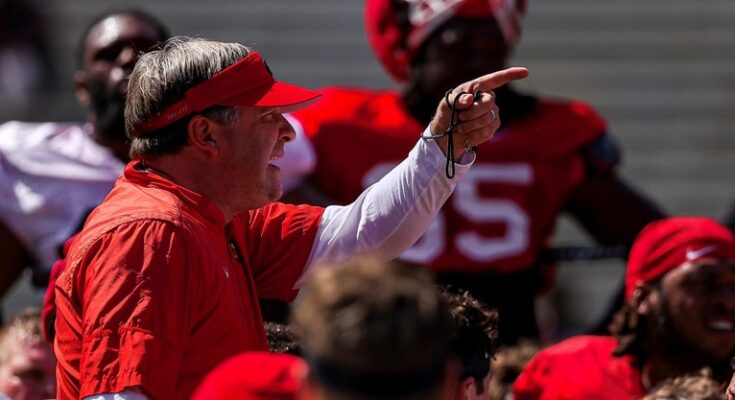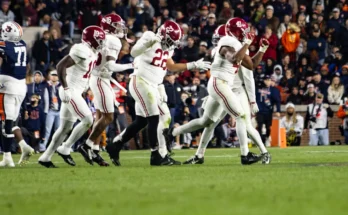Analyzing Where Georgia Bulldogs Football Stars Are Being Selected In Fantasy Football Drafts Ahead Of The 2025 College And NFL Seasons
Fantasy football has become a cultural phenomenon that bridges the gap between casual fans and diehard football enthusiasts, creating a world where statistics, matchups, and projections matter almost as much as the actual outcomes of games. Each year, fantasy drafts become a ritual for millions, and one of the fascinating elements is seeing how specific programs produce players who shape the fantasy landscape. The Georgia Bulldogs, one of the most dominant college football programs of the past decade, have consistently churned out elite NFL-caliber talent. As a result, fantasy managers are paying close attention to where Georgia products are landing in drafts for both the NFL fantasy football season and the emerging college fantasy football formats. With a pipeline of skill-position players, offensive linemen, and defensive stars, Georgia continues to supply the talent that fantasy players covet.
To understand where Georgia Bulldogs are being selected, it is necessary to first examine their NFL alumni. Running backs have historically been the Bulldogs’ most valuable contribution to fantasy football. Nick Chubb, D’Andre Swift, and Sony Michel were all highly drafted in their primes, and the trend continues with backs like Zamir White and James Cook, who carry sleeper appeal in many fantasy leagues. For 2025 fantasy football, Nick Chubb’s return from injury has been one of the more debated topics, as fantasy managers weigh his elite track record against concerns about durability. In most mock drafts leading into the season, Chubb is being selected in the mid-to-late second round, representing both optimism and caution. Meanwhile, James Cook, who has grown into a featured back role, is being drafted in the third to fourth round range, seen as a versatile RB2 with upside in PPR leagues.
At the wide receiver position, Georgia has been making its presence felt more in recent years. George Pickens of the Pittsburgh Steelers has become one of the most polarizing names in fantasy drafts. Known for his spectacular catches and fiery demeanor, Pickens is often selected in the fifth or sixth round, depending on scoring format. Fantasy managers see him as a high-upside WR2 or WR3 who could break out if his chemistry with the quarterback stabilizes. His big-play ability makes him attractive in best-ball formats as well, where managers are betting on splash weeks. Other Georgia receivers, such as Mecole Hardman, remain late-round dart throws, often undrafted in standard leagues but occasionally scooped up in deeper formats.
At tight end, Georgia’s impact is unquestioned. Brock Bowers, one of the most hyped tight end prospects in recent memory, is already making waves in fantasy drafts despite being a rookie. Early reports and preseason flashes have propelled him into the top ten at the position, and in some drafts he is going as high as the seventh or eighth round. His rare combination of athleticism, hands, and route-running ability has fantasy managers salivating at the prospect of him becoming an immediate TE1. Given the scarcity of elite tight ends in fantasy football, Bowers’ draft stock has risen rapidly, with many viewing him as a potential league-winning pick if he adapts quickly to the pro game.
Defensively, while individual players like Jalen Carter and Jordan Davis don’t have much direct fantasy value outside of IDP (individual defensive player) formats, their presence helps elevate the team defenses they play for. Fantasy managers who draft defenses often recognize the Georgia lineage as a mark of toughness and reliability. NFL teams loaded with ex-Bulldogs on defense, such as the Philadelphia Eagles, have seen fantasy managers prioritize them as a top-five defense selection in many drafts.
Switching focus to college fantasy football, a rapidly growing niche, the current Georgia roster also commands attention. Running back Nate Frazier, who has already generated buzz with his on-field performance and recent NIL headlines, is climbing up draft boards in college leagues. His explosiveness and ability to create big plays make him a valuable asset, with many ranking him as a top-10 running back in the college fantasy football player pool. Managers drafting in these leagues are often looking for consistent workloads, and Georgia’s history of featuring elite backs makes Frazier an appealing option. Similarly, fellow Bulldogs ball carriers like Branson Robinson and Andrew Paul have been late-round picks or waiver-wire targets, depending on the depth of individual leagues.
At quarterback, Georgia’s Gunner Stockton has not reached the upper tier of fantasy quarterbacks yet, but he is being drafted as a mid-to-late round stash in college formats. Fantasy managers see him as a possible breakout candidate if Georgia’s offensive system continues to evolve. His dual-threat capability gives him upside, though his floor remains lower compared to established stars at the position. In NFL fantasy drafts, Georgia quarterbacks historically have not been major players, but in college leagues, Stockton’s name carries potential.
The wide receiver position for the current Georgia team is also drawing fantasy intrigue. The addition of transfer stars like Zachariah Branch has given the Bulldogs a big-play threat who is already making noise in college fantasy drafts. Branch is being selected in the mid-rounds, usually between the fifth and seventh rounds, depending on the format, with managers eyeing his speed and ability to contribute in both receiving and special teams categories. Younger receivers are also being watched closely as potential breakout players who could become waiver-wire steals once the season begins.
Brock Bowers’ absence from the current Georgia roster following his move to the NFL has left an opportunity at tight end, but college fantasy players are still monitoring the Bulldogs for the next standout at the position. Georgia’s track record at tight end is strong enough that some managers are willing to take late-round flyers on younger players in the hope of striking gold.
One of the most fascinating elements of Georgia’s fantasy football influence is how their brand and reputation impact draft decisions. Managers often overvalue or undervalue players based on their program’s history. Georgia’s dominance in the SEC and reputation for producing NFL-ready talent creates a perception that Bulldogs players are safer picks, particularly at running back and tight end. This perception can sometimes lead to Georgia alumni being drafted earlier than their statistical projections would otherwise warrant. Fantasy is as much about psychology as it is about numbers, and Georgia’s consistent presence in the College Football Playoff has cemented them as a trustworthy pipeline in the minds of many managers.
Another angle worth examining is dynasty fantasy leagues, where managers draft with an eye toward long-term value. In these formats, Georgia players are often prioritized even more heavily because of the program’s track record of producing durable, high-level NFL talent. Brock Bowers, for example, is routinely selected as a top-50 player in dynasty startups, an incredible valuation for a rookie tight end. Nate Frazier, though still in college, has also become a stash candidate in leagues that allow managers to hold rights to incoming NFL prospects. Dynasty managers understand that investing in Georgia players is often a safe bet, as the program’s physical development and coaching prepare players well for the next level.
In redraft formats, the immediate production of Georgia alumni is what matters most. Managers looking for dependable weekly contributors often gravitate toward James Cook, who offers a stable floor in PPR scoring thanks to his receiving role. Others take the gamble on George Pickens, who can swing matchups with big plays but also carries volatility. Nick Chubb remains a polarizing case, with some managers drafting him as a potential league winner if fully healthy, while others avoid the risk and pivot to safer options.
What makes all of this so intriguing is how one program continues to shape the fantasy landscape across multiple formats. From established NFL stars to up-and-coming college players, the Georgia Bulldogs occupy a unique space where fantasy managers are consistently monitoring their talent pipeline. The combination of physical dominance, offensive philosophy, and defensive toughness ensures that Bulldogs players will always have fantasy relevance, whether as early-round anchors or late-round sleepers.
As the 2025 fantasy football season approaches, the question is not whether Georgia players will be drafted, but how high they will go. In both NFL and college formats, Bulldogs are fixtures in the conversation, reflecting the program’s status as one of the premier talent factories in the sport. Whether you are drafting Nick Chubb in the second round, gambling on George Pickens’ breakout in the sixth, investing in Brock Bowers’ rookie upside, or stashing Nate Frazier in a college fantasy league, Georgia’s presence is undeniable. For fantasy managers everywhere, keeping an eye on Athens has become an essential part of draft strategy, and that trend shows no signs of slowing down.



